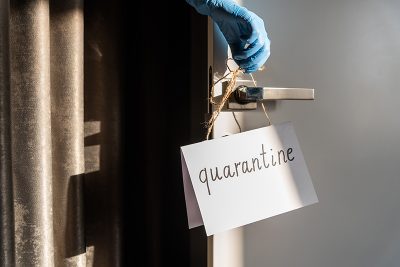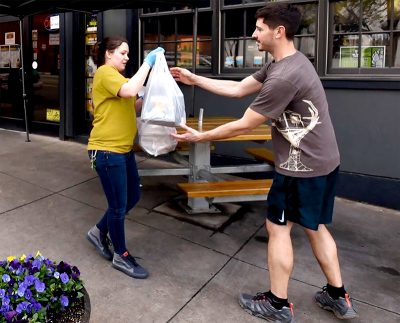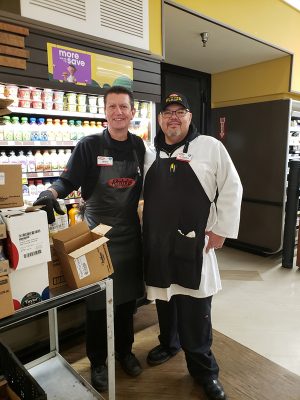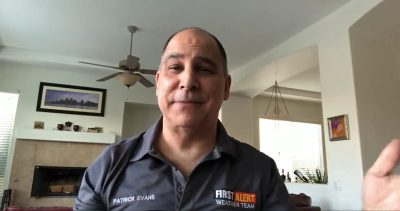
By Crystal Harrell
The month of March has been a whirlwind of change for Coachella Valley residents as more cases of the widespread coronavirus (COVID-19) continue to surface across the country in what has rapidly become a global pandemic. California Governor Gavin Newsom issued a statewide shelter-in-place order on March 19, asking citizens to stay home and nonessential businesses to be shut down in an effort to curb the spread of the disease.
This mandate has drastically affected local businesses on an economic level, as establishments have lost a significant amount of clientele and major events that normally garner profit from tourism this time of year have been postponed or canceled all together. Public health mandates that prohibit gatherings of 10 or more people have also greatly impacted sit-down restaurants.
In order to mitigate the situation, the City of Rancho Mirage is offering grants of up to $8,000 for restaurants to stay open and provide curbside service.
 “The chamber is thrilled that the City of Rancho Mirage is helping our restaurants through this challenging time while offering residents take-away meal options… We just spoke with Norma’s Italian Kitchen the other day about streamlining their menu for curbside and deliveries. Now is the time to offer a few favorite items to customers rather than the full menu, which will help with costs. The ownership at Norma’s has been very concerned with their regulars getting access to food. We are a tight knit community at the end of the day,” said President/CEO of the Rancho Mirage Chamber Katie Stice.
“The chamber is thrilled that the City of Rancho Mirage is helping our restaurants through this challenging time while offering residents take-away meal options… We just spoke with Norma’s Italian Kitchen the other day about streamlining their menu for curbside and deliveries. Now is the time to offer a few favorite items to customers rather than the full menu, which will help with costs. The ownership at Norma’s has been very concerned with their regulars getting access to food. We are a tight knit community at the end of the day,” said President/CEO of the Rancho Mirage Chamber Katie Stice.
 Another local business that has changed its way of operation amid the COVID-19 pandemic is Old Town Peddler, a family-owned bike rental shop in La Quinta that normally gets a lot of foot traffic this season as well as online and phone reservations. The first impact felt by owners Gabriel and Elisa Guerrero began in February with cancelations by people from Japan and China who were being told not to travel. Once local events like Coachella Fest began to get canceled, they were losing reservations on a daily basis.
Another local business that has changed its way of operation amid the COVID-19 pandemic is Old Town Peddler, a family-owned bike rental shop in La Quinta that normally gets a lot of foot traffic this season as well as online and phone reservations. The first impact felt by owners Gabriel and Elisa Guerrero began in February with cancelations by people from Japan and China who were being told not to travel. Once local events like Coachella Fest began to get canceled, they were losing reservations on a daily basis.
“There are still a large amount of tourists and now even locals who find themselves with time on their hands and limited entertainment options. Going outside for exercise is one of the few things we can still do, and it’s easy to practice social distancing on a bike. I’ve joked with customers that nobody can sneeze on you while you’re riding a bike,” said Elisa. “We’re still nervous because this is a family business and we have two small children, so we count on the season to get us through the summer. We’re trying to stay optimistic, but it’s definitely nerve wracking.”
Nonprofits are being severely hit as well. Many have had to close programs, postpone contract work, and cancel fundraising events that help them stay afloat by bringing revenue. There is the fear that donors will not be able to give as much even after businesses open their doors again and people go back to work. Contract work and paid programs may not return or be filled as much either.
Maria Wren is cofounder of SMaRT Education, a nonprofit that runs STEAM programs across the Coachella Valley with partner organizations, focusing on teaching robotics, coding through digital media, and engineering to children. SMaRT Education’s main site is located in Palm Springs with a designated classroom at the Palm Springs Air Museum, and might be severely affected in the aftermath of the COVID-19 outbreak.
“Some nonprofits are better able to weather this storm than others, just like for-profit businesses, but many nonprofits don’t have a large budget to float when revenue streams are down. For reference, there are over 110,000 nonprofits in California. Two-thirds of them are very small with annual expenses of less than $50,000 dollars. California nonprofits employ roughly 1.2 million people,” stated Wren.
 Grocery stores have been one of the essential businesses permitted to stay open during the pandemic, experiencing long lines leading outside stores and customers stocking up on items in excess, completely wiping products off shelves in the case of certain sanitary products. Some supermarkets have implemented new policies to accommodate the overcrowding and item hoarding, placing a limit on specific items that each customer can buy, like toilet paper, milk, eggs, and hand sanitizer.
Grocery stores have been one of the essential businesses permitted to stay open during the pandemic, experiencing long lines leading outside stores and customers stocking up on items in excess, completely wiping products off shelves in the case of certain sanitary products. Some supermarkets have implemented new policies to accommodate the overcrowding and item hoarding, placing a limit on specific items that each customer can buy, like toilet paper, milk, eggs, and hand sanitizer.
“People are usually respectful at the store, but there are moments when customers get angry and ask why we don’t have enough of a certain product or when we will be re-stocking. As employees, we aren’t responsible for how fast we get each shipment in, but we understand the urgency of the situation and how people are panicking over it. Working at a grocery store means you’re going to have busy days around Thanksgiving and Christmas, but when it comes to this, we aren’t sure how long this is going to last,” shared produce clerk Mark Putman, who has been working at the Palm Springs Ralphs for 30 years.
Local hospitals are anticipating an upsurge in patient admittance, even though there is limited bed occupancy and medical supplies at their disposal. There are plans to set up a temporary hospital inside the Riverside County Fairgrounds in Indio, a location in proximity to where the county’s reports of COVID-19-related deaths have occurred.
“It’s become a bit more stressful at work. We’ve taken greater precautions to protect ourselves by treating all patients as if they have the disease, which is called standard precaution. This means wearing personal protective equipment such as gloves, masks, goggles, and gowns. However, we’re facing difficulties because we have a shortage of masks, and it’s not just at our hospital, but all across the desert,” said Vina Casibang, who works as a monitor technician in the Eisenhower Medical Center Emergency Department.
Casibang recommends the standard protocol for combating COVID-19, which includes practicing good hygiene by washing your hands for at least 20 seconds and maintaining social distance by keeping yourself six feet away from other people.
Schools have also been impacted by the COVID-19 outbreak, with all public and private educational institutions in Riverside County to be closed until at least April 30, with a likelihood of students not returning until the start of the next school year. This development has greatly changed the way of life for instructors, students, and parents.
 Samantha Anderson is the mother of two high school students (Cameron and Maya) and even though she has not had any issues with ensuring her children are keeping up with their online assignments, there is an air of tension present in the household with staying put indoors.
Samantha Anderson is the mother of two high school students (Cameron and Maya) and even though she has not had any issues with ensuring her children are keeping up with their online assignments, there is an air of tension present in the household with staying put indoors.
“We are definitely starting to get stir crazy. It’s been difficult to get them to understand that we can’t just frivolously go out of the house. There have been many heated arguments, but they are reluctantly starting to conform,” explained Anderson.
Anderson’s son, Cameron, is a senior at La Quinta High School, and the main source of his concern is being able to start college on time while dealing with the disappointment of having his final year of school interrupted.
“As a senior in high school, my view of the situation is really different than that of any other grade. I don’t get to have prom, grad night, or any other senior trips or events that every senior usually gets to experience. I also have to worry about if any of the colleges I applied to will accommodate the mess that is happening right now,” stated Cameron.
While not able to teach in the classroom, educators are confident that this is a safe choice of action for the well-being of students, even though there are psychological side effects stemming from the widespread pandemic.
“Stress affects everyone differently. Some people cry or get anxious. Others get critical or argumentative. Just know that we all are doing the best that we can under less than perfect situations right now. I love and miss my students. I hope to see them all soon,” stated Chelly Basto, a Spanish teacher at Palm Desert High School.
Teachers are also supportive of how the school districts have adapted to the sudden closures so quickly and have accommodated students with essential tools and resources needed to continue their education as they are quarantined at home.
“Our district offered an extremely comprehensive enrichment program, equitable to all students. Our district has done a phenomenal job passing out chrome books and making sure our students have access and the support that they need. Personally, I called my students homes to check in with them last Friday. It’s hard being away from them,” said Jennifer Hunt, a fourth-grade teacher at Truman Elementary School in Desert Sands Unified School District.
Coachella Valley performers and musicians have been put out of work as well, delaying shows and cancelling gigs for the foreseeable future. Phylicia Mason is a 13-time Desert Theatre League-nominated actress who usually does back-to-back shows. She was set to open the ironically named HOW TO SURVIVE AN APOCALYPSE on March 13, but the Desert Ensemble Theatre Company decided to postpone the opening until next January.
“After a month of rehearsal, it was a devastating closure, but one that I agreed needed to happen. That weekend, every theater show in the valley ended up closing… I haven’t felt scared, but I do believe the dangers of COVID-19 are very real. I follow news stories, I share a lot of information, and I take the risks seriously. I think it’s important that we self-quarantine and stay informed,” explained Mason.
Local musicians have taken to live streaming their concerts to enable them to still perform for their supporters, even giving the option for viewers to tip them to provide a source of income.
“There might be repercussions to how we work from now on. It’s tough to think how people can support local musicians in this time when everyone needs to take care of each other. One thing that can be done is logging to their live streams and tipping them, and always keep them in mind when we go back to a semi-normal state of life,” said desert-based musician Miguel Arballo.
 Even the local media has changed up their normal practices to maintain social distancing, whether it be sitting farther apart at the anchor desk or broadcasting remotely from their own homes. Patrick Evans, KESQ News Channel 3 meteorologist and Host of Eye on the Desert, uses a system called “Splashtop,” which allows each meteorologist to connect to the weather system from their own laptops at home.
Even the local media has changed up their normal practices to maintain social distancing, whether it be sitting farther apart at the anchor desk or broadcasting remotely from their own homes. Patrick Evans, KESQ News Channel 3 meteorologist and Host of Eye on the Desert, uses a system called “Splashtop,” which allows each meteorologist to connect to the weather system from their own laptops at home.
“We also use an app called Live U or LU, which can stream broadcast quality video over WiFi. We have to access all the data, build the graphics, and prepare the presentation remotely, so we access several of the work computers to do so, as we also have to put in closed-captioning verbiage. Once set up, the process becomes easier as we go along,” explained Evans.
While the state of normalcy within the Coachella Valley certainly has shifted and tensions have run high for the lack of certainty regarding how long the spread of COVID-19 will pose a threat to the community, there is the reassurance of knowing that residents stand on a unified front—facing similar challenges and struggles while anticipating the day when they can press “play” on life again.
This notion is echoed by private music instructor and mother of four, Linda Lemke Heinz, who is still promoting an environment of productivity and encouragement, even in the face of a global emergency.
“The hardest thing for me as a mother is not having all the answers, or not knowing what the future holds. This is uncharted territory for us, but I’m grateful we are together.”











































